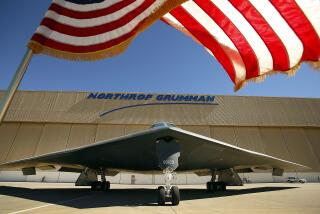Fix C-17 or Lose It, McDonnell Douglas Told : Aerospace: In a move that could cost up to 20,000 Southern California jobs, the Pentagon says it will look elsewhere unless deficiencies are overcome.
- Share via
WASHINGTON — McDonnell Douglas Corp. must correct the problems in its troubled C-17 cargo plane within two years, the Pentagon said Wednesday, or the government will seek another contractor for the project--a step that could cost Southern California up to 20,000 defense-related jobs.
McDonnell Douglas, which has until the end of the week to agree to the new terms, was unusually noncommittal about whether it has the ability to continue the multibillion-dollar C-17 program.
“We are studying it and we expect to reply to the Defense Department promptly,” said Larry McCracken, a spokesman for the company’s C-17 program.
However, Defense Secretary Les Aspin and other Pentagon officials said they expect the company to accept the offer.
In announcing the new terms, Aspin said the C-17, a heavy-cargo airplane designed to land on short, makeshift airfields, is especially adaptable to the needs of a post-Cold War military.
“We need the airlift,” he said, warning that if McDonnell Douglas cannot deliver the program in a timely, cost-effective manner, the Pentagon will go outside Southern California for an alternative.
Loren Thompson, deputy director of National Security Studies at Georgetown University, agreed that the C-17 is now the best means for delivering heavy equipment, tanks and other armor.
“In the case of the Bosnian conflict,” Thompson said, “it’s not clear that free access to the Adriatic Sea will be available. In such a situation, you would have only a handful of airstrips you could operate from, and most of them are relatively primitive.”
Under the terms offered by Aspin on Wednesday, McDonnell Douglas would have two years to deliver 12 new C-17s, each of which must be produced on a precise time schedule and be free of the wing and test-flight problems that have plagued the plane.
If the company succeeds, the number of C-17s the government will have bought from McDonnell Douglas will grow to 40.
The Pentagon would then purchase 80 more C-17s from the company’s assembly plant in Long Beach.
“We’re trying a probationary period here,” Aspin said. “We’ll give two years for the program to be put right and, at that end of those two years, we’ll make a judgment as to whether we want to buy more of their C-17s.”
If the company does not “turn the corner” in the two-year period, Aspin said, the government will look for a second contractor. Such a step could mean the loss of 15,000 to 20,000 jobs at McDonnell Douglas and among subcontractors.
In other provisions of the government offer:
* The company would agree to drop about $1.2 billion in legal claims against the government and spend $456 million in new flight testing and management improvements.
* The government would agree to spend $348 million, including $237 million to settle the McDonnell Douglas claims, with the remainder going mainly to the flight-test program.
“On balance, the settlement is a good deal for the government,” Aspin said.
If the Pentagon continues to work with McDonnell Douglas and the full complement of 120 planes is eventually delivered, the total cost would be just under $40 billion.
But Aspin cautioned that the Pentagon had seriously considered terminating its contract. The problems, he said, are many.
The planes have suffered from structural failures in ground tests, ground and flight tests are behind schedule, deliveries have been late and costs are escalating, Aspin said, adding that McDonnell Douglas is bearing losses in excess of $1 billion.
John Deutch, undersecretary of defense for acquisitions, said he expects McDonnell Douglas to agree to the requirements, which are contained in a restructured contract and require authorization and appropriation by Congress.
“The experts and the government . . . say this is doable,” he said.
More to Read
Inside the business of entertainment
The Wide Shot brings you news, analysis and insights on everything from streaming wars to production — and what it all means for the future.
You may occasionally receive promotional content from the Los Angeles Times.










